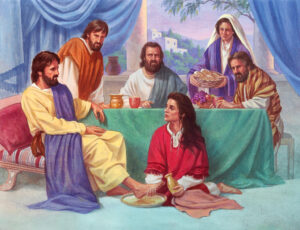Daily Lesson for Monday 11th of November 2024
Six days before Passover, Jesus came to visit Mary, Martha, and their brother Lazarus, whom Jesus had raised to life. Simon, who had been healed of leprosy, hosted a feast in appreciation for what Jesus had done for him. Martha was serving, and Lazarus was sitting at the table with the guests (John 12:1-8).
What was the significance of Mary’s actions here? How was this a witness to who Jesus really was? (See John 12:1-3.)
The perfume was very expensive, worth about a year’s wages for the common laborer. Mary probably brought this gift as an expression of gratitude to the Savior for the forgiveness of her sins and for the resurrection of her brother. She intended it to be used someday for the burial of Jesus. But then she heard that He would soon be anointed King. In that case, she would be the first to bring Him honor.
Mary probably did not intend for her gesture to be noticed, but John notes, “The house was filled with the fragrance of the perfume” (John 12:3, ESV). Judas responded with a quick rebuke, stating that the perfume should have been sold and the proceeds given to the poor. Jesus immediately put Mary at ease by stating, “ ‘Let her alone; . . . The poor you have with you always, but Me you do not have always’ ” (John 12:7-8, NKJV).
A recurring theme runs through the Gospel. Jesus knows what is in people (John 2:24-25; John 6:70-71; John 13:11; John 16:19). In this instance at Simon’s feast, Jesus knows what is in Judas. John is careful to point out who Judas is—a self-serving thief (John 12:6).
“The fragrant gift which Mary had thought to lavish upon the dead body of the Saviour she poured upon His living form. At the burial its sweetness could only have pervaded the tomb; now it gladdened His heart with the assurance of her faith and love. . . . And as He went down into the darkness of His great trial, He carried with Him the memory of that deed, an earnest of the love that would be His from His redeemed ones forever.”—Ellen G. White, The Desire of Ages, p. 560.
|
Jesus knew what was in the heart of Mary and the heart of Judas. He knows what’s in your heart, as well. What should this truth tell us about the need of Christ as our righteousness, transforming us and covering us, as well? |
 (0)
(0)



